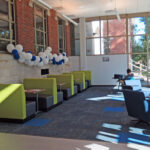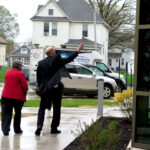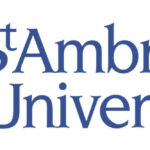Study abroad program offers SAU students fresh perspective
By Barb Arland-Fye
The Catholic Messenger
The most important social justice issue in the Middle East today, which also impacts the environment, is the place of women in traditional society and their role as leaders, says Alex Cicelsky of Israel. That issue figured prominently in a study abroad program he led earlier this winter for a group from St. Ambrose University in Davenport. His collaborator was Ryan Dye, the university’s director of International Education and a professor of history. Dye also leads the university’s Middle East Institute, where Cicelsky taught as a visiting scholar last semester.
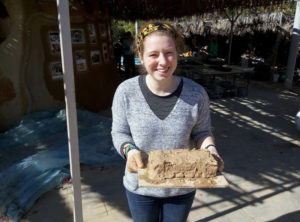
St. Ambrose University student Sophie Foreman holds a homemade brick at Kibbutz Lotan, an eco-Jewish community in Israel. A study abroad program provided the students to learn about social justice issues in the Middle East.
During the trip Dec. 27-Jan. 11, the group of 10 unpacked the theme “Peace, Justice and Environment in Israel, Palestine and Jordan” while visiting those countries, interacting with Jews, Muslims and Christians and getting their hands dirty in the soil. Eight students, their benefactor, and Dye participated.
“The goal of the course was to examine how sharing the fragile environment of Israel and Palestine will be instrumental in establishing lasting peace in the region,” said Cicelsky, a founding member of Kibbutz Lotan and the collective’s Center for Creative Ecology. He wanted the students to discover “a region with a diverse collection of cultures, historical and religious artifacts, environmental challenges and natural marvels.”
Prior to traveling to the Middle East, the students attended four class sessions to learn about the formation of the State of Israel, the present geopolitical situation, the environmental challenges the region faces, and preparing for travel in the Middle East.
Their journey began in the north of Israel, in Nazareth, where students spent the first few days learning about Jesus’ ministry in the town around the Sea of Galilee. They proceeded to Jerusalem and Bethlehem and then made their way to Jordan. They spent a day in Aqaba on the Red Sea and one day at Petra, described as a famous archaeological site in Jordan’s southwestern desert. Then they made their way to southern Israel, to Kibbutz Lotan, an eco-Jewish community, where the group spent four nights.
“We had so many interesting conversations with so many different people,” Dye observed. He also noted that Alex is a “real foodie.” So the group enjoyed a variety of culinary experiences. “When we ate out, he made sure we met the proprietor of the restaurant. They’d tell us their stories,” Dye added.
He said the experience that most impacted students was a visit to economically depressed Rahat, Israel, a city with the largest Bedouin population in the country. A Times of Israel article published a year before their visit bore this headline: “Is Rahat the Ferguson of Israel?”
Robyn Kincaide, an international studies and political science major at St. Ambrose, said meeting with three young Bedouin women in Rahat had the greatest impact on her. The women “spoke to us about the difficulties they faced by challenging traditional gender roles and pursuing degrees in higher education. We met with many different people throughout our trip, but hearing the stories of these women who are about my own age was particularly moving. They have so many societal factors working against them, yet they continue to push on to better their lives.”
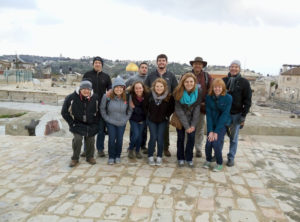
A group representing St. Ambrose University in Davenport traveled to Israel as part of a study abroad program. Pictured are, front, from left, Nancy Heeren, Andrea Bonetto, Josie DePauw, Sophie Foreman, Jaimi Nelson, Robyn Kincaide; back, Ryan Dye, Joe Barnum, Ryan Noone, David Schoneveld and Alex Cicelsky.
Cicelsky said he wanted the students to “hear as many women’s voices as possible.” They met Meirav, who left her life as a TV broadcaster to start an organic farm that hosts youths at risk. Another day the students met Anat, who has led the call for equality of access for women to holy sites in Jerusalem. They also met Keren on Kibbutz Lotan, who had worked with poor families in Nepal. She taught them about food security. Three female graduate students in Rahat shared their respect for their culture while working to change their society’s attitudes toward freedoms for women in movement, education and economic development. “To hear their struggles and courage moved me and the students deeply,” Cicelsky said.
“A significant driver of environmental challenges in this region is the increase in population. The flip side of the increased demands for water and energy by the growing population is a vibrant and creative youthful population,” he added.
At the Kibbutz, the St. Ambrose group ate and worshipped with the community and participated in the community’s “green apprenticeship program” where they learned about a system of agriculture and social design principles called permaculture. About 200 people live in the kibbutz, in their own homes on the site. All the work they do is for the good of the kibbutz, Dye said. The community’s cooperatively owned dairy, date orchards and tourism facilities are the main sources of income.
Cicelsky arranged for the St. Ambrose group to have hands-on experience, such as farm labor. Israeli farmers had donated plots of land on which to grow crops that go to charities. Volunteers pick the crops. “We volunteered to pick crops for a few hours and our task was to pick cabbage,” Dye said.
“From my perspective as director, this was the richest study abroad program I have ever participated in,” he continued. “We got our hands dirty in a cabbage patch. We had a lot of conversations with ordinary Jews, Muslims and Christians. We got a feel for what it would be like to live, work and study there.”
Kincaide said she returned to the U.S. “even more confused about my feelings on the political situation in Israel and Palestine than I was before. It’s one thing to theorize about a one-state or two-state solution in the classroom, but quite another to visualize how either could actually come to be when you visit the area and see how intertwined the lands, resources, infrastructure, etc. are.
“The experience was an excellent reminder not to believe everything you see in the news. The media can make it seem as though the region is constantly violent and war-torn, but I never once felt unsafe. Despite political tensions, life goes on. People we met from all communities and all walks of life were very welcoming to us, and very willing to share their stories.”









